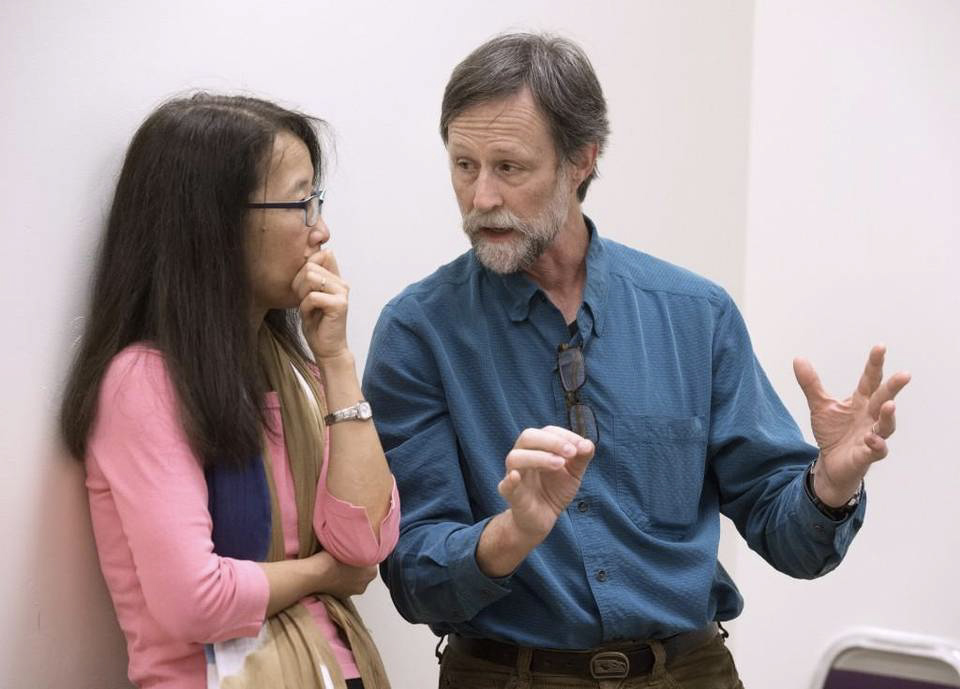By Andrew Hamlin
NORTHWEST ASIAN WEEKLY

Zhang Er and Gregory Youtz conferring on their previous opera “Fiery Jade” from 2016. (Photo by John Froschauer)
“Tacoma Method” refers to the forceful expulsion of Tacoma’s entire Chinese population, stemming from an anti-Chinese riot that started in the city on Nov. 3, 1885. A mob of white citizens forced the Chinese onto trains, then burned down almost every building in the Chinese community.
It seems an unlikely subject for a modern opera.

Gregory Youtz is a professor of Music Composition at Pacific Lutheran University. Youtz has studied music in China, Indonesia, and Trinidad and Tobago. (Photo by Judy Mitoma)
But a while back, Tacoma Opera’s then-General Director Noel Koran asked composer Gregory Youtz to work on an operatic version of the story. Youtz in turn brought in librettist Mingxia Li, known professionally as Zhang Er, to work alongside him.
“A couple of things surprised me from my research,” recounted Zhang Er, who teaches at Olympia’s Evergreen State College. “First, I learned the Tacoma Method was part of a much larger anti-Chinese violent political and labor movement, as demonstrated by the 1882 Chinese Exclusion Act passed by Congress. The act was renewed multiple times until 1945, and only terminated in WWII when China became an ally of the United States.
“Second, 60-70% of Tacoma residents participated in the expulsion. Third, there were plenty of openly racist remarks published proudly in local newspapers, which became a rich resource for the libretto.”
Her main problem in creating her words, she elaborated, was that she lacked material about the Tacoma Chinese community, working mostly from Census data, plus historical maps and graphs. This wasn’t much to go on, even though 10% of the Tacoma population was Chinese at the time of the expulsion.
“Then I found the affidavits of several Chinese businessmen in court, when the mob members were brought to face the law. Mrs. May, the leading heroine of the opera, is derived from the affidavit of the [real-life] merchant, Mr. Lum May.
“Once I found my heroine, I knew we would have an opera.”
The finished piece consists of a short prelude, followed by two full-length acts. The first act follows Lum May, played by Suchan Kim, as he celebrates Lunar New Year, plans for the future, and visits with white friends. The second act covers the run-up to the riot itself as the white townspeople, urged on by Robert McPherson as Tacoma’s Mayor Jacob Weisbach, boil rapidly up to violence.
The action ends with a short coda, sung by Soon Cho as Mrs. May, a sad goodbye to her vision of the American Dream, and warning future generations that more hatred may be on its way.
This marks Zhang Er’s third opera libretto, and her third operatic collaboration with composer Youtz.
“I love opera,” she enthused, “where the human singing voice conveys the deepest feeling with the widest range. I believe it is the most profound way to tell a story, and reach the core of a human being.”
The two collaborators settled into a routine.
“As it happened, I wrote the libretto first,” Zhang Er explained. “Gregory Youtz would compose a fragment of it, and I would hear it and discuss it with him. Then we would move on to another fragment. A lengthy and slow process. He sometimes asked me to change or add new songs to specific segments.
“For ‘Tacoma Method,’ we first debated long and hard about the structure of the work, while I was constructing the outline of the libretto. We eventually decided to focus on the event itself rather than wrapping it with contemporary commentary and reconciliation gestures. People need to see it as it happened. To feel the anger of the white settlers and the anguish of the expelled Chinese community, to reflect on its relevance in the contemporary world. The audience will come to their own conclusions, after experiencing such strong emotions.”
The “Tacoma Method” opera, a presentation of Tacoma Opera, runs March 31-April 2 at Tacoma’s Rialto Theater, 310 South 9th Street.
For showtimes, tickets, and other information, visit tacomaopera.org. For more information on the Tacoma Method incident, visit tacomamethod.com.




